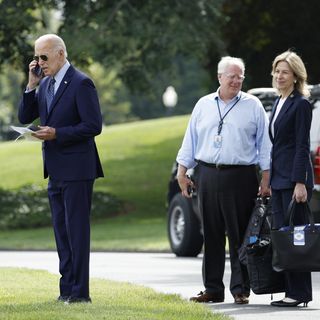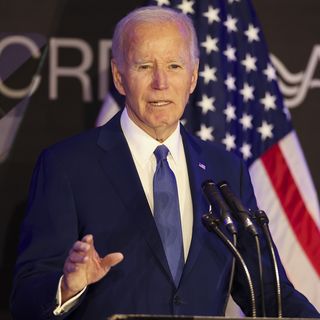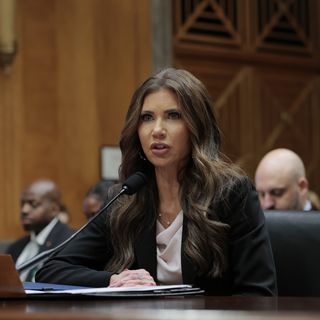Reading view
Andrew Cuomo Accuses DOJ of 'Election Interference' Amid Reported Inquiry
"Lawfare": Andrew Cuomo rep takes aim at Trump amid reports he's under DOJ investigation
Representatives for Andrew Cuomo, a New York City mayoral race front-runner, on Tuesday questioned the timing of a reported Trump Department of Justice investigation into the former Democratic N.Y. governor.
Why it matters: The New York Times first reported that the investigation into Cuomo over decisions he made as governor during the COVID pandemic began about a month ago, after the DOJ moved to have the criminal corruption case against NYC Mayor Eric Adams dismissed.
- "That puts the Trump administration in the unusual position of having ended a criminal case against the leader of the nation's largest city — Mr. Adams, who is running for re-election as an independent — and opened one into his chief rival, Mr. Cuomo, who is leading the Democratic primary field in the polls, in the span of a few months," the NYT noted.
What they're saying: "We have never been informed of any such matter, so why would someone leak it now?" said Rich Azzopardi, a spokesperson for Cuomo, in a statement shared with outlets including Axios.
- "The answer is obvious: This is lawfare and election interference plain and simple — something President Trump and his top Department of Justice officials say they are against," he added.
State of play: Cuomo came under fire during the early stages of the pandemic for his handling of COVID in nursing homes and House Republicans in a criminal referral last year accused him of violating the law by allegedly making false statements during congressional testimony on the matter.
- The NYT reports that U.S. attorney's office in D.C. began the investigation into Cuomo in response to this when Ed Martin was running the office before he was replaced by former Fox News host Jeanine Pirro, whom the NYC mayor candidate beat to become N.Y. state attorney general in 2006.
- Pirro was scathing in her criticism of Cuomo's handling of the pandemic on her show "Justice with Judge Jeanine," notably saying in one segment after he was accused of covering up nursing home deaths in 2021: "You cannot escape the consequences of your intentional and reckless acts."
- Azzopardi said in his emailed statement Tuesday that Cuomo "testified truthfully to the best of his recollection about events from four years earlier, and he offered to address any follow-up questions from the Subcommittee — but from the beginning this was all transparently political."
- A DOJ spokesperson declined to comment on the matter.
Editor's note: This article has been updated with new details throughout.


Caitlin Clark Makes Major WNBA History in Fever-Dream
Trump's Approval Rating Slides to Match Lowest This Term, New Poll Shows
Who Won 'Celebrity Wheel of Fortune' Tonight, May 20?
Shedeur Sanders' True Feelings About Browns Rookie Dillon Gabriel Revealed
Johnson nears last-minute SALT deal with blue state GOP holdouts
The House GOP's blue state holdouts are close to a deal on the "big, beautiful bill" that would raise the state and local tax (SALT) deduction cap to $40k a year for people making up to $500,000 a year, sources familiar told Axios.
Why it matters: Getting the blue state holdouts on board is a must-do for House Speaker Mike Johnson, who wants a House floor vote Wednesday on the full bill.
Zoom in: Johnson offered the holdouts on Monday an increase for the state and local tax (SALT) deduction cap from $10,000 to $40,000 a year, within income limits.
- The speaker then got an assist from President Trump, who told the holdouts to cut a deal and warned them to stop pushing so hard.
- The agreement that's in final negotiations is a $40k a year cap for people making up to $500,000 a year. The income phaseout would grow 1% a year for 10 years, and then the deduction would become permanent.
- Not all the details have final agreement, but sources said they're making progress and they expect most SALT members to agree to the terms before passage.
The bottom line: That number would keep the GOP within the $350 billion window that it has left for cuts, according to the reconciliation bill instructions.


Biden agreed to $4 million campaign salary for top aide: new book
This story is adapted from the new book "Original Sin: President Biden's Decline, Its Cover-Up, and His Disastrous Choice to Run Again," by CNN's Jake Tapper and Axios' Alex Thompson.
Mike Donilon, a top adviser to former President Biden, was paid about $4 million to work on the 2024 Biden campaign at the president's insistence, CNN's Jake Tapper and Axios' Alex Thompson write in their new book, "Original Sin."
Why it matters: The sum was orders of magnitude higher than the pay for other top aides — campaign chair Jen O'Malley Dillon made $300,000 — and illustrates the standing held by Biden's inner-most circle of advisers.
- Many former Biden officials remain bitter at Donilon for making so much money and, in their view, guiding the campaign into disaster.
Behind the scenes: In early 2024, Donilon agreed to shift from the White House to the campaign, but wouldn't budge on his asking price.
- "The president told the campaign: Pay Mike what he wants," the authors report. "Senior campaign staff were outraged when they heard about this arrangement."
Between the lines: Donilon's pay has caused further resentment among many Biden aides toward the former president's inner-circle and their handling of the re-election campaign.
- They argue that Biden's top aides should have had to courage to confront him about the huge risks of running for a second term, and not profited so much from what was ultimately an unsuccessful campaign.
- Some former Biden aides are quietly trying to separate themselves from the Biden re-election effort.
What they're saying: A Biden spokesperson did not respond to a request for comment.
- Donilon has rejected the notion that Biden's acuity and judgment declined during his tenure, calling it an "impression" fueled by the media.
The book is based on interviews with more than 200 people, mostly Democratic insiders, with knowledge of the events that unfolded during the final two years of Biden's presidency. Almost all of the interviews took place after the 2024 election.
Go deeper: Exclusive: Biden aides discussed wheelchair use if he were re-elected, new book says


Google is putting more AI in more places
Google used this week's I/O developer conference to announce a slew of new AI features and experiences, along with a new $250-a-month subscription service for those who want to access the company's latest tools.
Why it matters: Google is aiming to prove that it can make its core products better through AI without displacing its highly lucrative advertising and search businesses.
Key announcements Google made Tuesday:
- It debuted Flow, a new AI filmmaking tool that draws on the company's latest Veo 3 engine and adds audio capabilities. The company also announced Imagen 4, its latest image generator, which Google says is better at rendering text, among other improvements.
- Google said it would soon make broadly available its latest Gemini 2.5 Flash and Pro models and add a new reasoning mode for the Pro model called Deep Think.
- Google will make its AI Mode, a chat-like version of search, broadly available in the U.S. and it's updating the underlying model to use a custom version of Gemini 2.5.
- It's also beginning to allow customers to give large language models access to their personal data — starting with the ability to generate personalized smart replies to Gmail messages that draw on a user's email history. That feature will be available for paying subscribers this summer, Google CEO Sundar Pichai said.
- On the coding front, Google offered further details on Jules, its autonomous agent, which is now available in public beta. Microsoft and OpenAI have also announced new coding agents in recent days.
For those who want to make sure they can have the most access to Google's AI models, the company is introducing Google AI Ultra, a $250-a-month service.
- The high-end subscription — an alternative to the standard $20-a-month basic service — includes access to a number of its most powerful AI agents, models and services, as well as YouTube Premium and 30TB of cloud storage.
Also in Google's cavalcade of demos, the company showed an early prototype of its Android XR glasses searching, taking photos and performing live translation.
- The glasses have audio and camera features similar to Meta's Ray-Ban smart glasses, but also offer an optional display. (Meta is also said to be working on a version of its glasses with a built-in display for later this year.)
- Partners include Samsung and eyewear makers Warby Parker and Gentle Monster.
The big picture: Google's event comes a day after Microsoft made a slew of announcements at its Build conference in Seattle. Anthropic, meanwhile, is holding its first-ever developer conference on Thursday in San Francisco.
Go deeper: Google upgrades AI tools for shopping


James Carville Says He'll Back AOC If She Wins 2028 Democratic Nomination
Boogie Cousins Says Cooper Flagg is Not No 1 Overall Pick
James Harden Expected to Opt Out of Clippers Contract: Report
Google cofounder Sergey Brin shares why he's back at the company 'pretty much every day now' to work on AI
Kelly Sullivan/Getty Images
- Google cofounder Sergey Brin just made a surprise appearance at the company's I/O conference.
- Brin said he's back at Google "pretty much every day now," where he's been developing AI products.
- Brin also spoke about why Google Glass failed, though he's bullish about Google's new XR glasses.
Google cofounder Sergey Brin made a surprise appearance onstage at the company's flagship I/O developer conference Tuesday, where he explained why he's returned to the tech giant and what he's learned from the failure of Google Glass over a decade ago.
It's the latest sign that Google is going hardcore on AI. Brin has been back at Google to help develop its AI products since 2023 as the search giant races against OpenAI's ChatGPT, and he shared about what he's been up to since returning to the trenches.
Brin wasn't expected to speak at the talk, which Google billed solely as an interview of its DeepMind CEO Demis Hassabis. He joked, "I torture people like Demis, who is pretty amazing. He tolerated me crashing this fireside."
In the chat with Hassabis, Brin said he comes into Google "pretty much every day now" to chip in on training the latest models from Gemini. It's something that naturally interests him, the famously technical co-founder said.
"I tend to be pretty deep in the technical details," Brin said. "And that's a luxury I really enjoy, fortunately, because guys like Demis are minding the shop. And that's just where my scientific interest is."
Since returning to Google, Brin also attended last year's I/O, where he fielded reporters' questions about AI.
Learning from Google Glass
At the 2012 Google I/O conference, Brin famously demoed a video in which he wore Google Glass while skydiving to show off the tech giant's previous foray into wearables. This year, he also addressed Google Glass, which it stopped selling a decade ago.
At the Tuesday fireside, Brin said Google Glass's failure stemmed partly from his lack of knowledge about manufacturing and supply chains.
"I just didn't know anything about consumer electronic supply chains, really, and how hard it would be to build that and have it at a reasonable price point," he said.
Brin is far more bullish on Google's latest wearables venture: "XR," or Extended Reality, glasses. At the fireside chat, he said he thinks AI is far more capable now for such a product.
Business Insider was able to snap a picture of the normally reclusive billionaire trying the XR glasses on before the fireside chat, too:
Charles Rollet / Business Insider
Elon Musk says he isn't ruling out merging xAI and Tesla
Dado Ruvic/REUTERS
- Elon Musk said it's "not out of the question" to merge his AI startup with Tesla if shareholders approve.
- xAI, which Musk founded in 2023, acquired X in March in an all-stock purchase.
- Tesla shares rose 0.5% but dipped in after-hours Tuesday, remaining around 10% down since January 2.
Elon Musk said on Tuesday that he isn't ruling out merging his AI startup with Tesla.
"Well, I guess anything is possible," Musk told CNBC show host David Faber in a two-part interview, when asked whether Musk would ever consider merging xAI into Tesla as a way to gain more control over the EV company.
"There are no plans to do so," Musk said. "It's not out of the question, but obviously it would require Tesla shareholder support."
Musk launched xAI as a startup in 2023. The company acquired X, his social platform formerly known as Twitter, in an all-stock transaction valuing xAI at $80 billion and X at $33 billion in March. The AI chatbot Grok was also introduced to X and trained in part on the social media platform's data.
Elon Musk said in the Tuesday interview that Tesla and xAI will continue sourcing AI chips from Nvidia and AMD. He told Faber that xAI has deployed 200,000 GPUs at its Colossus facility in Memphis and plans a 1 million-GPU site nearby, but he did not disclose any specific chip orders.
Based on documents previously viewed by Business Insider, xAI is also spending at least $400 million on building a supercomputer in Memphis, and may encounter difficulties because the city's power grid might not yet be capable of powering a project of that magnitude.
Following the CNBC appearance, Tesla shares saw a 0.5% boost at market closing time compared to the day before, but dipped slightly in after-hours trading.
Though Tesla stocks have been on the rise in May since Musk said he would leave DOGE, the EV company's shares are still at around 10% down compared to where it was on January 2 this year amid struggling Q1 sales and declining confidence in Musk's priorities.
Tesla did not respond to a request for comments.
Lakers Superstar Luka Doncic Reportedly Turning Page With Conditioning Plan
Cardinals' Surprisingly Strong Start Deemed 'Not Real' In Early MLB Playoff Outlook
Biden camp pushes back against suspicion over cancer diagnosis timing
Former President Biden's team on Tuesday sought to shut down questions over how long they've known about his cancer diagnosis.
The big picture: After previous concerns that the 82-year-old's health issues may have been covered up in the past, Biden's disclosure over the weekend that he has Stage 4 prostate cancer was met with both sympathy and speculation over its timing.
What they're saying: A spokesperson for Biden told Axios in an emailed statement Tuesday evening that the former president's last known prostate-specific antigen (PSA) test was in 2014.
- "Prior to Friday, President Biden had never been diagnosed with prostate cancer," the spokesperson said.
State of play: The U.S. Preventive Services Task Force recommendation on screening for prostate cancer holds that it's an individual choice for men age 55-69 and that it offers a small potential benefit of reducing the chances of death.
- They worry about potential harms of screening, including additional testing, prostate biopsy, over-treatment and complications.
- For those 70 and older, like Biden, they advise against it, saying with moderate certainty that potential benefits don't outweigh expected harms.
Between the lines: Biden was 70 or 71 years old when he had his last PSA, before he had symptoms that led to last Friday's exam. That's within standard guidelines and is not unusual.
- It is noteworthy, however, that he apparently was not tested for it even while he was president.
Context: Biden's personal office announced his diagnosis on Sunday.
- "On Friday, he was diagnosed with prostate cancer, characterized by a Gleason score of 9 (Grade Group 5) with metastasis to the bone," they said.
- Even at that advanced stage, physicians say the condition can be managed, thought not cured.
- He was evaluated last week after doctors found a "small nodule" in his prostate during a routine physical exam.
Go deeper: Biden's cancer diagnosis draws sympathy — and suspicion


"Blatantly defied" court: Lawyers say Trump admin deported immigrants to South Sudan
Immigration attorneys have accused the Trump administration of deporting immigrants from Myanmar and Vietnam to South Sudan in violation of a court order, per a filing Tuesday that's requesting their "immediate return."
The big picture: The attorneys made the filing in a Boston-based federal court to U.S. District Judge Brian Murphy, who's already ruled that sending undocumented immigrants to countries they're not citizens of would "clearly violate" an earlier order against sending people to third countries.
Driving the news: The lawyers said the man from Myanmar, identified as N.M., was delivered a notice in English without an interpreter on Monday, saying he'd be sent to South Sudan, an East African country that the State Department advises U.S. citizens not to travel to due to "continued security threats" that include crime, kidnapping, and armed conflict.
- "N.M. has limited English proficiency," said a San Francisco-based attorney in a Tuesday filing that said she was told after the fact that her client had been "removed" from Texas' Port Isabel Detention Center to South Sudan.
- The emergency filing in the Massachusetts District Court said T.T.P., a national of Vietnam, "appears to have suffered the same fate as N.M." and the lawyers had "information that there were likely at least 10 other" immigrants on the deportation plane to South Sudan.
- The lawyers said this "blatantly defies" the court order prohibiting sending immigrants to third countries and requested the judge block any further such deportations.
- Representatives for the Trump administration did not immediately respond to Axios' request for comment in the evening.
Go deeper: First flight leaves U.S. under Trump's $1000 "self-deport" deal

